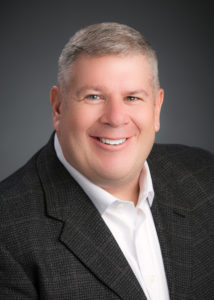Bryan Witherbee has built a career solving problems with cutting-edge technology.
Complex problems have complex solutions, and people like Bryan Witherbee are at the forefront of helping humanity address some of its toughest challenges. Equal parts scientist and entrepreneur, Witherbee’s career has ranged from contributing to the development of life-saving medicine to empowering farmers with the technology needed for improving sustainability and stabilizing their industry. It’s a pretty impressive resume for a guy who says he has never been much of a planner.
After graduating from the University in 1994 with a degree in biology, Witherbee headed to St. Louis. Only about three hours from his hometown of Galesburg, Illinois, it was a natural progression, and in addition to landing a job, he was hoping to remain close to friends he made at school.
“I wish I could take credit for executing around a grand plan that had its roots back at Truman, but I have never been a planner,” he said. “I definitely have benefited from a philosophy of saying ‘yes’ to most opportunities or adventures.”
Witherbee launched his career as a contractor in the health and human services division of Monsanto. Between the corporate landscape of mergers and acquisitions, along with Witherbee’s can-do attitude and willingness to take on all challenges, it is difficult to quantify how many companies he has worked for and all the roles he has occupied. Figuring conservatively, he’s had about 10 different titles at roughly half a dozen companies.
“I have been open to moving down different paths, learning new technologies, instruments or techniques, traveling to different locales, meeting new people, challenging current concepts and taking risks to innovate and improve,” he said.
At all his stops, the pattern that emerges is clear: Witherbee has the scientific chops to understand how a project should run and the business acumen to make big ideas become realities, whether it is using next generation technology to grow more food without increasing costs or implementing key biological analysis protocols for genotyping and cell screening.
“The common thread is that the roles I have taken have centered around new technology development and implementation, usually around solving a problem where there is no existing solution, or existing solutions that do not scale to be mass produced or cost too much to implement,” he said. “Leading a team that can overcome issues or identify a different path has been my later career path.”
Witherbee’s most recent endeavor is Agragene, an agricultural biotechnical company focused on sustainable pest control. After being introduced to the company’s board through the BioSTL network, he worked with its investors to relocate the venture from San Diego to St. Louis, and he currently serves as the president and CEO. Agragene’s core technology is the ability to manufacture sterile insects through the use of gene editing tools such as CRISPR (Clustered Regularly Interspaced Short Palindromic Repeats). Sterile insects are then released into fields where they mate with invasive pests. Because they are sterile, no offspring are produced, and during the growing season the total number of invasive insects decreases, as does the amount of damage done to crops.
While one of the more beneficial aspects to this approach is its reduction in chemical insecticides, Witherbee is well aware that concepts like gene editing, gene sequencing and nanotechnology can raise their own areas of concern, especially among those without a scientific background. The concept of increasing public awareness while simultaneously implementing these technologies in an ethical manner is a challenge he welcomes.
“These technologies are tools, and like any tools, their impact depends on how we use them. Gene editing, for example, holds incredible potential to cure genetic diseases, improve food security and even fight cancer. Nanotechnology can lead to safer, more effective medicines and cleaner energy solutions,” Witherbee said. “It’s important to be cautious and ethical. Scientists, governments and the public all need to be part of the conversation about how these technologies are developed and applied. Transparency, regulation and public input are essential to ensure they are used responsibly for the greater good.”
Witherbee’s track record would indicate he is a principled steward of the resources at his disposal. It’s one of the reasons he still has a passion for his work now three decades into his career.
“I love getting people excited about science and technology, to show and share what is possible and maybe help imagine a better future,” he said. “When I worked in pharma, it was exciting to know that a medicine that I contributed to, or that was developed by our company, was helping people live longer, healthier lives. In agriculture, it is incredibly rewarding to see how new technologies could empower farmers and growers.”
Witherbee and his wife Shelby (Wooden) Witherbee (’95) live in St. Peters, Missouri. Their daughter, Riley, continued the family connection with Truman and is a two-time graduate. After earning a bachelor’s degree in 2024, she received a Master of Arts in Education in the spring.



